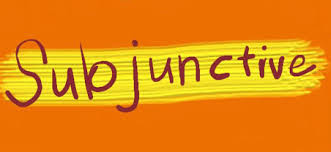English grammar - Subjunctive

Subjuntive - the subjunctive mood is one of the very important grammatical topics in English. A subjunctive sentence, also known as a command sentence, is a type of sentence that is not coercive like an imperative sentence, and only wants someone to do something.
If you are not sure about the usage and structure of hypothetical sentences, read the article below to practice!
1. Subjunctive sentences use would rather and that
- In fact, this type of sentence is similar to a conditional sentence, but instead of the "If" structure, we use withwould rather. The divisions are similar to conditions of types 1, 2 and 3.
+ Expressing events in the present (present subjunctive):
Sample sentences:
S1 + would rather that + S2 + [verb in simple form] …
For example:
- I would rather that you call me tomorrow.
-
He would rather that I don’t take this train.
+ Describes events that are contrary to current reality
The verb after the second subject will be conjugated simple past, to be must be divided into were in all places.
S1 + would rather that + S2 + [verb in simple past tense] …
For example:
-
Henry would rather that his girlfriend worked in the same department as he does.
(His girlfriend does not work in the same department)
-
Jane would rather that it were winter now. (Infact, it is not winter now)
If you want to form a negative form, use didn’t + verb or were not after subject two.
-
Henry would rather that his girlfriend didn’t work in the same department as he does.
- Jane would rather that it were not winter now.
+ Describes events contrary to past reality
S1 + would rather that + S2 + past perfect …
-
Bob would rather that Jill had gone to class yesterday.
(Jill did not go to class yesterday)
- Bill would rather that his wife hadn’t divorced him.
Attention: Modern grammar allows omissions that in some sentences the subjunctive is used would rather
English grammar – subjunctive mood
2. Subjunctive sentences are used with the verbs in the table below
|
Advise |
Demand |
Prefer |
Require |
|
Ask |
Insist |
Propose |
Stipulate |
|
Command |
Move |
Recommend |
Suggest |
|
Decree |
Order |
Request |
Urge |
– It must be in the sentence that.
– The verb after subject 2 is always in the infinitive form.
| Subject1 + verb + that + subject 2 + [verb in simple form] … |
For example:
-
We urge that he leave now.
- I command that you go to work late.
Note: In British English, the infinitive can be preceded by “should”
For example:
-
The judge insisted that the jury return a verdict immediately.
-
The university requires that all its students take this course.
-
The doctor suggested that his patient stop smoking.

English grammar – subjunctive mood
3. Subjunctive sentences used with adjectives
Adjectives used in hypothetical sentences include those in the table below.
|
Advised |
Necessary Essential Vital |
Recommended |
Urgent |
|
Important |
Obligatory |
Required |
imperative |
|
Mandatory |
Proposed |
Suggested |
In the following formula, the adjective specifies one of the adjectives found in the table above.
| it + be + adjective + that + subject + [verb in simple form ]…(any tense) |
For example:
-
It is necessary that he find the books.
-
It was urgent that she leave at once.
-
It has been proposed that we change the topic.
-
It is important that you remember this question.
In some cases, you can use nouns corresponding to the above adjectives according to the following formula.
| it + be + noun + that + subject + [verb in simple form ]…(any tense) |
For example:
- It is a recommendation from a doctor that the patient stop smoking.
4. Subjunctive sentences used with It is time
It is time (for smb) to do smth: it is time to do something. (time just right, don't make assumptions)
For example:
- It is time for me to get to the airport (just in time).
But:
-
It is time
-
It is high time subject + simple past (it is high time – assuming the time is a little late)
-
It is about time
Comment: High/ about is used before time to add emphasis.
For example:
- It’s high time I left for the airport. (it is a little bit late)
- It’s about time I done my work. ( it is late and I have many works to do)
Hope you use the structure effectively!


